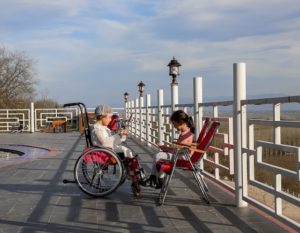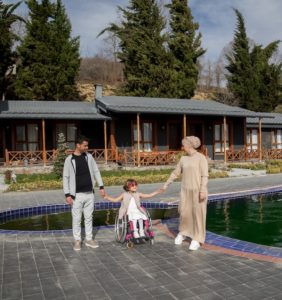Psychological Issues In Spina Bifida
By Dr Yang Wai Wai, Clinical Child Psychologist, Department of Paediatrics, Hospital Canselor Tuanku Muhriz, Universiti Kebangsaan Malaysia. Edited by Dr Chua Li-Shun.
In conjunction with Spina Bifida and Hydrocephalus Awareness Month, Spina Bifida Association of Malaysia (SIBIAM) presents a series of articles modified from our website (http://www.sibiam.my) and the Beyond the Cord quarterly newsletter – an initiative by the District Action Group on Spina Bifida and Hydrocephalus (DASH), Rotary District 3300. This article was originally published online (https://sibiam.my/sibiam-talk-9-psychological-issues-in-spina-bifida/), as part of the SIBIAM Monthly Health Webinar Series for October 2021 (https://youtu.be/NxklUMsZj88).
 Psychological issues in children revolve around developmental, neuropsychological, emotional and social aspects. The biopsychosocial approach to understanding health involves different issues that may overlap.
Psychological issues in children revolve around developmental, neuropsychological, emotional and social aspects. The biopsychosocial approach to understanding health involves different issues that may overlap.
Expectations for children differ according to their age groups. During infancy (0-11 months old) and toddlerhood (1-3 years old), children are very dependent on their parents. Therefore, the health and functioning of the family unit is most important. The family must be continuously provided with information about spina bifida. This is best achieved by connecting with peer support groups or organisations like SIBIAM.
It is imperative to start looking at the child’s developmental needs and provide necessary stimulation and therapy. Whenever parents identify a developmental delay, we should apply early intervention and encourage regular physical activity. Self-management and independence can be encouraged by teaching children to keep their own toys.
During this early stage, parent-child attachment, parenting skills and parental mental health are important aspects too. A child is dependent on adults, so parents must function well. Many parents are anxious and worried because of lack of experience and support. They can have issues like poor mental health, post-partum depression, or post-traumatic stress due to the birth process itself.
In early childhood (3-6 years old), we focus on neuropsychological development, pre-school education, individualised or special education, social skills and friendship, as well as family relationships. Play and socialisation are essential in preparing children for school and time away from their family. Although most spina bifida children are able to enter normal school, some may not. Those that need special school will require an individualised education plan according to their developmental level. A child should develop most basic skills by 5 years old and can be assessed according to the expected progress. A psychologist will be able to recommend any intervention necessary.
 The family functioning level must be assessed and re-evaluated periodically because a family that may be coping well at present might not do as well later. This can be due to certain life events, change in employment status or family structure; for example, arrival of younger siblings which add onto the parents’ responsibilities. Parents should have access to professionals who can discuss about the spina bifida child’s future education plan.
The family functioning level must be assessed and re-evaluated periodically because a family that may be coping well at present might not do as well later. This can be due to certain life events, change in employment status or family structure; for example, arrival of younger siblings which add onto the parents’ responsibilities. Parents should have access to professionals who can discuss about the spina bifida child’s future education plan.
By the time children reach school-going age (6-13 years old), they should have enough support to participate in academic and extra-curricular activities. Some teachers are concerned when there are students with medical problems in their class. Therefore, parents need to understand their child’s condition and establish a good relationship with the school. Psychologists can support and provide necessary documents to ensure spina bifida children are not separated from other kids and given the same opportunities to participate in school activities, with or without modification.
Children are encouraged to pursue activities, hobbies and other interests, including sports. Building friendships and relationships is tantamount to school life. Parents must learn to identify emotional or behavioural changes. Children with disabilities might face bullying in school; this must be addressed before it causes further mental distress. However, there is a need to strike a balance to see what the child can handle on their own. There should ideally be a partnership between the child and family in managing challenging situations.
Adolescence (13-18 years old) includes secondary school and transition into adulthood. Self-management and independence must be established during this period. Issues specific to adolescence include relationships with peers, development of risky behaviour, maturity of talents and skills, and sexual health issues. There is a misconception that disabled children do not need sexual health education; the truth is they need the knowledge to protect themselves, just like any other children. Targeted social skills training may be required as there may be lack of social skills due to various factors, including isolation or disconnect due to their medical needs.
Spina bifida teenagers should be encouraged to nurture certain talents from hobbies or training that can become opportunities for employment. We must allow them to explore as many interests as possible in order to identify and build on their strengths. Although there is lack of access to individualised education plans at secondary school level, it is possible to look into vocational training suitable for different kinds of disabilities.
Adolescents may hang out with friends who indulge in high risk behaviours like smoking, drinking, or take recreational drugs. Bullying can still occur. Teenagers might experience repeated isolation or seclusion, which is a risk factor for depression and anxiety. Although some behaviours can be attributed to hormonal changes, they can also be due to low self-esteem and result in anhedonia or reduced participation in activities.
Parents and spina bifida children are encouraged to discuss their psychological issues with any accessible and trusted healthcare professional because psychologist support may not always be available. Most importantly, be open with any concerns so the healthcare personnel can provide psychological first aid before referring to relevant specialists.
By Dr Yang Wai Wai, Clinical Child Psychologist, Department of Paediatrics, Hospital Canselor Tuanku Muhriz, Universiti Kebangsaan Malaysia. Edited by Dr Chua Li-Shun.
World Spina Bifida and Hydrocephalus Day is celebrated annually on 25 October. This year’s theme is “Elevate Your Voice”. SIBIAM is celebrating the day with a colouring competition for spina bifida children, themed “My Voice Matters”, and writing competition for spina bifida teens and adults with the theme “Inclusion is the Solution”. Winners have been announced on the Facebook page. For more information, email info@sibiam.my.
